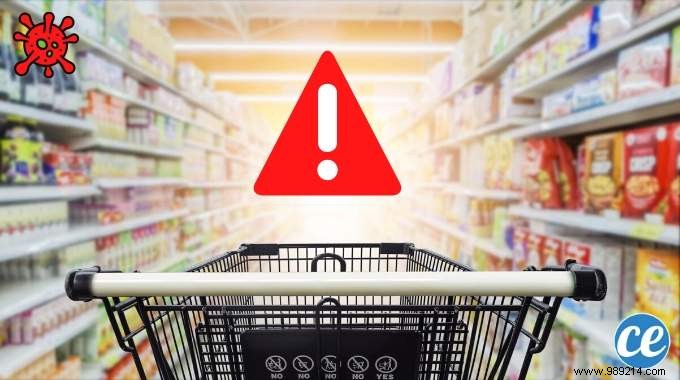
Since the beginning of the confinement, shopping has not been a part of fun!
Indeed, the simple fact of entering a store is to take the risk of being contaminated...
Fortunately, a group of scientists has made concrete recommendations to avoid transmission of the coronavirus in supermarkets.
Here are 10 new tips for shopping without being contaminated by COVID-19 . Watch:

From now on, when shopping, it is not recommended to use supermarket trolleys or shopping bags.
Why ? Because the coronavirus can remain active on all surfaces, including supermarket shopping carts.
Moreover, some brands have removed them to avoid contaminating their customers.
Also remember to disinfect your bags and shopping bags after finishing your shopping.
Before you go shopping, wash your hands well at home.
Also remember to take a hydroalcoholic gel with you.
This way, you can wash your hands again when you enter the store and immediately when you leave the store.
If you don't have disinfectant gel, you can use one of these recipes to make at home.
You should then wash your hands again as soon as you get home.
After removing all the packaging from the purchased products, you must wash your hands one last time.
Why ? Because the Covid-19 can still be active for a few hours on the packaging of your products.
In any case, go shopping alone and leave your family safe at home.
Do you want to put on gloves to go shopping? Bad idea!
Contrary to what one might think, it is not advisable to wear gloves in the shops.
Why ? According to Professor Pelletier, with gloves, you feel protected. As a result, we pay less attention...
We wash our hands less and we tend to touch our face more frequently.
As a result, the virus is transmitted more easily by touching the cart or food products.
And we take the risk of being contaminated by touching our face.
It is important to keep a distance of at least one meter from all other supermarket customers.
1 meter is the minimum!
The ideal is to keep 2 meters between you and other customers and employees of the supermarket.
So even if a person coughs or sneezes, their sputters are less likely to hit you...
If a direction of traffic has been established in the store, respect it.
And avoid meeting other customers on the shelves. How?
To do this, walk slowly when you reach the end of a radius so as not to run into someone who is coming.
And if someone is picking up a product from a shelf, wait until they're done to approach you.
To avoid contaminating fruits and vegetables, it is important not to touch them.
Even if you want to take them in hand or smell them to know if they are ripe, you really have to think about not doing it!
It is therefore best to get closer and take a good look at them before choosing them.
If we touch one, we have to put it directly in the cart and buy it.
And this, even if the fruit or vegetable in question is not exactly as you want it.
No need to multiply the risks of contamination or spread of the virus because of fruits and vegetables!
And it's the same principle with the products that are on the shelves:pasta, rice, preserves, yogurts, etc.
If you hesitate between one product or another, think carefully before taking the product in hand.
Because once you have touched a product, "you are obliged" to put it in your cart.
Why ? Because if everyone touches and puts down products after handling them, the coronavirus can quietly spread.
The rule is therefore the same as for vegetables:a product handled equals a product purchased.
Until your hands are perfectly clean, do not touch your face while shopping.
It sounds simple like that, but it's not that simple.
Try a few minutes at home and you'll see that it's not so easy!
In fact, everyone is used to touching their face an average of 60 times a day...
And it is as many risks of being contaminated, if the virus is deposited on your hands.
For the same reason, avoid using your phone while shopping.
By touching your phone, you can drop the virus on it.
If you answer a call, the virus can then be transmitted to your face.
In any case, also remember to regularly disinfect your smartphone with this tip.
Once you arrive at the checkout, it is also essential to take precautions.
First of all, don't get too close to the crate. Keep 1 or 2 meters away.
Also avoid touching the treadmill and other areas near the checkout that may be touched by other people.
If you can and if the amount is not too high, choose contactless payment.
That way, there is absolutely no contact between your credit card and the payment terminal.
If contactless payment is not possible, pay by credit card, avoiding touching the payment terminal as much as possible.
If you have to pay in cash, put down your notes and coins without touching the cashier's hand.
Shopping at the drive-thru is a good way to limit contact between people.
Provided that all contact between the client and the employee is avoided!
For this, it is also important to respect simple and effective rules.
First, open the trunk before the delivery person arrives with your order.
Also have the receipt scanned from a distance to avoid being too close.
Finally, let the delivery person drop your groceries in your trunk while keeping your distance.
During the entire reception of the order, remember to stay more than one meter from the delivery person.
If possible, have your groceries delivered to your home.
This reduces the risk of environmental or person-to-person contamination.
The fewer people you meet, the less you leave your home, the less your risk of being contaminated.
And even when you have groceries delivered, you must stay more than one meter away from the delivery person.
It is also preferable that the delivery person does not come home and leaves the shopping on your doorstep.